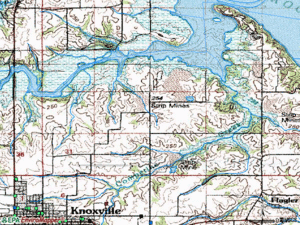Competine Creek (Des Moines River tributary) facts for kids
Quick facts for kids Competine Creek |
|
|---|---|

Competine Creek (Des Moines River) (United States Environmental Protection Agency)
|
|
| Country | US |
| State | Iowa |
| District | Marion County, Iowa |
| Physical characteristics | |
| River mouth | Des Moines River 41°22′04″N 93°02′18″W / 41.3677°N 93.0383°W |
Competine Creek is a small but important waterway located in Iowa, a state in the United States. It flows for about 9.8 miles (15.8 kilometers) and plays a role in the local environment. This creek is a natural feature that helps connect different parts of the landscape.
Contents
Discovering Competine Creek
Competine Creek is known as a tributary. This means it is a smaller stream or river that flows into a larger one. For Competine Creek, its journey ends when it joins the Des Moines River. The Des Moines River is a much bigger river that flows through Iowa.
Where Does It Flow?
The creek begins its path southwest of a town called Knoxville. This area is located in Marion County, Iowa. From there, Competine Creek winds its way through the land. It eventually reaches Lake Red Rock. This lake is actually a reservoir formed by a dam on the Des Moines River.
What is a Creek?
A creek is a natural stream of water, usually smaller than a river. Creeks are important parts of the natural world. They help carry water across the land. This water can come from rain, melting snow, or underground springs.
Why Creeks Are Important
Creeks like Competine Creek are vital for many reasons. They are like natural highways for water. This water is essential for plants and animals that live nearby.
Home for Wildlife
Creeks provide a habitat for various types of wildlife. Fish, insects, and other small creatures live in the water. Animals like birds and deer often visit creeks to drink water. The plants that grow along the creek banks also depend on this water.
Part of a Bigger System
Every creek, no matter how small, is part of a larger water system. Competine Creek flows into the Des Moines River. The Des Moines River then flows into the Mississippi River. This shows how all waterways are connected. They work together to move water across continents and eventually to the ocean.
 | Aaron Henry |
 | T. R. M. Howard |
 | Jesse Jackson |

